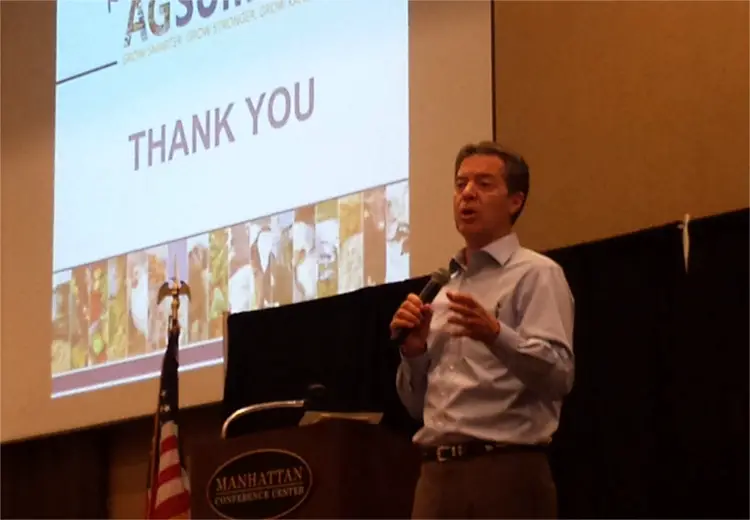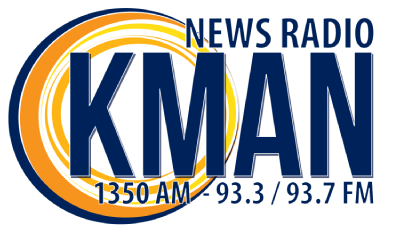
Kansas Gov. Sam Brownback summed up the situation his state is facing when it comes to its core industry — agriculture — bluntly.
“It’s not been pretty,” Brownback said in Manhattan Tuesday. “And you can’t say I can see the prettiness down the road just yet.”
And perhaps that sense of uncertainty was why Brownback was in the Little Apple for the first-ever Kansas Governor’s Summit on Agriculture Growth in the Manhattan Conference Center.
An Aug. 5 government report showed the value of land and buildings on Kansas farms fell 7 percent last year and cropland values also fell 7 percent to $2,050 per acre.
Cropland with irrigation averaged $3,000 an acre, down $270 per acre. Cropland without irrigation averaged $1,940, down $150 an acre.
Pastureland was valued at $1,290 per acre, down $100 per acre.
The summit covered various topics that included everything from beef and wheat to workforce challenges and even the potential for industrial hemp production.
After his opening remarks, the Republican governor took time to speak with KMAN about the agriculture market in the state, Manhattan’s growth and the November election.
ON KANSAS AG
“You can’t grow the Kansas economy without growing the agricultural economy,” Brownback said. “You just — you need it. It’s such a big piece of what Kansas is, and this last, really, couple of years, agriculture has just had a really difficult financial situation.”
In February, a report by the National Agricultural Statistics Service said there were 60,400 farms in Kansas for 2015, down 600 from the previous year.
It also reported the number of Kansas farms with less than $100,000 in agricultural sales decreased by 800 farms, while the number of those with more than $100,000 in sales grew by 200 farms.
Brownback said the downturn in the ag market — of which he largely contributed to global factors — and the downturn in oil and gas commodities has been a one-two punch to the state.
“It’s been a difficult time,” he said.
He did point out one highlight though: the state’s dairy industry.
“We’ve got good bright spots in the state,” he said. “The dairy industry continues to expand, rapidly. We’ve got the biggest single-build dairy processing plant in the country going up in Garden City by Dairy Farmers of America. Dairy Farmers of America is moving its headquarters into the state.
“We think we’ve got a good chance to get the American Royal longtime stock show but then to also build around it an animal genetics complex that you can export animal genetics and have the hub of some of that around the world.
“The (Kansas City, Missouri-based) Animal Health Corridor continues to grow and NBAF here in Manhattan is going to be a key piece of that long term. So we’ve got a number of very positive things.”
Still, there is a sense of panic among those in the ag industry in the Sunflower State as prices across the board have dropped significantly due to oversupply.
When asked if there is anything the state can do to alleviate some of these ills, Brownback said it was largely out of Topeka’s hands.
“Yeah, there’s just not a lot,” he said. “It’s a global commodity issue. You can try to do things to help people hold their costs down and the costs of regulation within the system, for them to be a little more efficient and competitive, but long term it’s a commodity business — it cycles up and cycles down.”
And in a state that slashed income taxes drastically in 2012 at Brownback’s charge, market downturns are hard to ignore.
“It does have a big impact on the state,” he said. “Because when you got two of your three major legs of the Kansas economy in agriculture and oil and gas down, state receipts really take a hit, and they have.”
Still, Brownback is optimistic.
“Kansas City is growing strong,” he said. “And that really helps us out. But still, the base of much of the Kansas economy is struggling and I don’t know of anybody willing to say when it pulls out, only that it will, because people do still need to eat. We are a very competitive agriculture — and oil and gas state for that matter. We will be in the marketplace, we will stay and we’ll come out of it.
“But it’s… it’s not been pretty.”
ON MANHATTAN
“It feels great — particularly getting (here) at the front end of football season,” Brownback, a Kansas State University alumni said.
“Bill Snyder has been such a legendary gift to this state and what he does with young men coming into that program that many of which are not highly recruited and he just molds them into a fantastic team. It’s the scenario you want to see everywhere.”
Brownback also commended Snyder for his encouraging note he wrote to the lone survivor of a deadly wreck on Aug. 19 that took the lives of four people, including three Silver Lake High School students, on Highway 24.
“He’s such a quality guy,” Brownback said. “I saw the other day he writes a note to one of the kids that survived the terrible car wreck on 24 highway. What a classy guy and what a classy program. I appreciate him and what he’s done for the state of Kansas.”
Brownback, who said he’d tour the construction of the National Bio and Agro-defense Facility (NBAF) and speak with K-State interim president Gen. Richard Myers Tuesday afternoon, complimented Manhattan’s past and continued growth.
“The building that has been going on here has been fantastic,” he said. “It’s one of the great growing towns in the state and we need growing towns. And I think it has a long term, really nice trajectory.
“I think it has a lot to offer.”
Brownback said the state’s commitment in sharing some of the costs of NBAF helped secure it.
“I think our stepping up really helped stimulate some of the federal people to say, ‘Well, if the state’s going to step up and take its share, we’ll get this put together,'” he said.
Of the facility’s $1.25 billion price tag, the state of Kansas has committed $307 million while the City of Manhattan signed on for $5 million.
The remaining $938 million is federally funded.
NBAF is slated to be completed by 2022.
ON THE NOVEMBER ELECTION
“What a different election cycle,” Brownback said. “You’ve got two presidential candidates both having issues. You’ve got a populous in the country not happy — not happy with the direction of the country.
“It’s really a lot of populous tinge to the moment right now.”
At the state level, primary results on Aug. 2 showed an electorate that punished those with ties to the governor. Voters ousted 11 of Brownback’s allies in favor of more centrist candidates.
“I do have faith in the system,” he said. “The system rights itself. The system expresses itself. And it works. This system has worked and worked well for this country for over two centuries, but you really feel that angst and anger.
“Median family income has gone down over the last seven years. This is the wrong direction. A lot of people are concerned about how we’re projecting ourselves internationally, about what’s happening to the family… there’s a lot of angst, and we’ll see how that’s expressed then in November.”
The median family income in 2014 — the most recent figure — was $53,657. While it was a slight increase from 2013, Brownback is correct in stating it is lower than it was in 2007 — just before the onset of the Great Recession.
When asked if he sees the trends of the August primaries continuing in November for the state of Kansas, he said he wasn’t sure.
“It’s hard to predict,” Brownback said. “The Republican Party in the state of Kansas is a big tent party. So you saw a lot of competition in the Republican primary and you didn’t see that as much on the other side of the isle.
“But it’s a big tent party. You saw a different wave of people come forward, but you know, that’s an expression of people’s interest and attitudes. I hope those people come on forward into the fall, help us resolve the issues that we’ve had.
“We’ve had difficult budget situations. We just haven’t had the revenues coming in, and that’s in spite of… well, we just haven’t had the revenues coming in. So hopefully that starts to turnaround. It’s something similar to other states in our area. Oklahoma’s got budget problems, Missouri, Iowa, Nebraska… we have a lot of commodity bases here.
“We’ve got good employment numbers overall, but man, we need some growth.”

